Tips for Finding Your Perfect Shoe
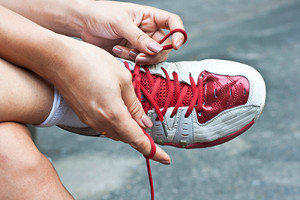 The first step to getting into a proper running routine is to make sure you are wearing the right running shoes. The proper shoe will help to correct biomechanical issues and prevent injury. You should always go to a sneaker store that specializes in running shoes so that the workers can help you find a sneaker that fits your foot strike. There are three main types of runners based on foot strikes: overpronators (when the foot rolls inward too much), neutral pronators (feet roll inward slightly), and supinators (feet don’t roll inward enough). Certain running shoe stores will have you run on a treadmill so that the workers can best determine which shoe type will fit you properly. You will know the shoe is a good fit if you “feel like you want to go run immediately," said runner Dimity McDowell.
The first step to getting into a proper running routine is to make sure you are wearing the right running shoes. The proper shoe will help to correct biomechanical issues and prevent injury. You should always go to a sneaker store that specializes in running shoes so that the workers can help you find a sneaker that fits your foot strike. There are three main types of runners based on foot strikes: overpronators (when the foot rolls inward too much), neutral pronators (feet roll inward slightly), and supinators (feet don’t roll inward enough). Certain running shoe stores will have you run on a treadmill so that the workers can best determine which shoe type will fit you properly. You will know the shoe is a good fit if you “feel like you want to go run immediately," said runner Dimity McDowell.
If you are a runner, wearing the right running shoe is essential. For more information, contact Donald Manger, DPM from Associated Podiatric Physicians, PA. Our doctor can provide the care you need to keep you pain-free and on your feet.
Choosing the Right Running Shoe for Your Foot Type
To increase performance and avoid the risk of injury, it is important to choose the right running shoe based on your foot type. The general design of running shoes revolves around pronation, which is how the ankle rolls from outside to inside when the foot strikes the ground.
- Neutral runners are able to choose from a wide variety of shoes, including minimalist shoes or even going barefoot.
- Runners who overpronate, or experience an over-abundance of ankle rolling, should choose shoes that provide extra motion control and stability.
- Runners who underpronate, or supinate, have feet that have high arches and lack flexibility, preventing shock absorption. They require shoes with more flexibility and cushion.
If you have any questions please feel free to contact our office located in Hamilton Township, NJ . We offer the newest diagnostic and treatment technologies for all your foot and ankle needs.
Footcare for the Summer
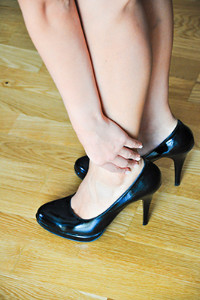 When the weather warms up, it is tempting for women to choose high heels as their choice of footwear. However, the human foot is built to walk on natural grounds, without the use of a high heeled shoe. Heels cause feet to shift into an unusually inclined position, which therefore results in foot damage. Most humans are born with healthy feet, with the damage developing over time. It is important to take precautions in terms of taking care of your feet, and choosing not to wear heels may preserve their health.
When the weather warms up, it is tempting for women to choose high heels as their choice of footwear. However, the human foot is built to walk on natural grounds, without the use of a high heeled shoe. Heels cause feet to shift into an unusually inclined position, which therefore results in foot damage. Most humans are born with healthy feet, with the damage developing over time. It is important to take precautions in terms of taking care of your feet, and choosing not to wear heels may preserve their health.
Everyday foot care is very important to prevent infection and other foot ailments. If you need your feet checked, contact the podiatrists from Associated Podiatric Physicians, PA. Our doctors can provide the care you need to keep you pain-free and on your feet.
Everyday Foot Care
Often, people take care of their bodies, face and hair more so than they do for their feet. But the feet are a very important aspect of our bodies, and one that we should pay more attention to. Without our feet, we would not be able to perform most daily tasks.
It is best to check your feet regularly to make sure there are no new bruises or cuts that you may not have noticed before. For dry feet, moisturizer can easily be a remedy and can be applied as often as necessary to the affected areas. Wearing shoes that fit well can also help you maintain good foot health, as well as making it easier to walk and do daily activities without the stress or pain of ill-fitting shoes, high heels, or even flip flops. Wearing clean socks with closed shoes is important to ensure that sweat and bacteria do not accumulate within the shoe. Clean socks help to prevent Athlete’s foot, fungi problems, bad odors, and can absorb sweat.
If you have any questions please feel free to contact our office located in Hamilton Township, NJ. We offer the newest diagnostic and treatment technologies for all your foot and ankle needs.
Read more about Every Day Foot CareFootcare for the Summer
 When the weather warms up, it is tempting for women to choose high heels as their choice of footwear. However, the human foot is built to walk on natural grounds, without the use of a high heeled shoe. Heels cause feet to shift into an unusually inclined position, which therefore results in foot damage. Most humans are born with healthy feet, with the damage developing over time. It is important to take precautions in terms of taking care of your feet, and choosing not to wear heels may preserve their health.
When the weather warms up, it is tempting for women to choose high heels as their choice of footwear. However, the human foot is built to walk on natural grounds, without the use of a high heeled shoe. Heels cause feet to shift into an unusually inclined position, which therefore results in foot damage. Most humans are born with healthy feet, with the damage developing over time. It is important to take precautions in terms of taking care of your feet, and choosing not to wear heels may preserve their health.
Everyday foot care is very important to prevent infection and other foot ailments. If you need your feet checked, contact Donald Manger, DPM from Associated Podiatric Physicians, PA. Our doctor can provide the care you need to keep you pain-free and on your feet.
Everyday Foot Care
Often, people take care of their bodies, face and hair more so than they do for their feet. But the feet are a very important aspect of our bodies, and one that we should pay more attention to. Without our feet, we would not be able to perform most daily tasks.
It is best to check your feet regularly to make sure there are no new bruises or cuts that you may not have noticed before. For dry feet, moisturizer can easily be a remedy and can be applied as often as necessary to the affected areas. Wearing shoes that fit well can also help you maintain good foot health, as well as making it easier to walk and do daily activities without the stress or pain of ill-fitting shoes, high heels, or even flip flops. Wearing clean socks with closed shoes is important to ensure that sweat and bacteria do not accumulate within the shoe. Clean socks help to prevent Athlete’s foot, fungi problems, bad odors, and can absorb sweat.
If you have any questions please feel free to contact our office located in Hamilton Township, NJ . We offer the newest diagnostic and treatment technologies for all your foot and ankle needs.
The Importance of Diabetic Foot Care
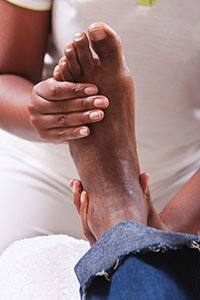 Although a diabetic’s main concern may be managing blood sugar, they should also make sure to take proper care of their feet. At times, diabetes may cause nerve damage in the feet. This condition is known as neuropathy. Neuropathy causes the nerves in the feet to have limited or no sensitivity to pain. As a result, calluses and small foot scrapes can very quickly become dangerous infections and wounds. It is important for diabetics to have their feet inspected on a daily basis and examined by a podiatrist at regular intervals.
Although a diabetic’s main concern may be managing blood sugar, they should also make sure to take proper care of their feet. At times, diabetes may cause nerve damage in the feet. This condition is known as neuropathy. Neuropathy causes the nerves in the feet to have limited or no sensitivity to pain. As a result, calluses and small foot scrapes can very quickly become dangerous infections and wounds. It is important for diabetics to have their feet inspected on a daily basis and examined by a podiatrist at regular intervals.
Diabetic foot care is important in preventing foot ailments such as ulcers. If you are suffering from diabetes or have any other concerns about your feet, contact the podiatrists from Associated Podiatric Physicians, PA. Our doctors can provide the care you need to keep you pain-free and on your feet.
Diabetic Foot Care
Diabetes affects millions of people every year. The condition can damage blood vessels in many parts of the body, especially the feet. Because of this, taking care of your feet is essential if you have diabetes, and having a podiatrist help monitor your foot health is highly recommended.
The Importance of Caring for Your Feet
- Routinely inspect your feet for bruises or sores.
- Wear socks that fit your feet comfortably.
- Wear comfortable shoes that provide adequate support.
Patients with diabetes should have their doctor monitor their blood levels, as blood sugar levels play such a huge role in diabetic care. Monitoring these levels on a regular basis is highly advised.
It is always best to inform your healthcare professional of any concerns you may have regarding your feet, especially for diabetic patients. Early treatment and routine foot examinations are keys to maintaining proper health, especially because severe complications can arise if proper treatment is not applied.
If you have any questions please feel free to contact our office located in Hamilton Township, NJ. We offer the newest diagnostic and treatment technologies for all your foot and ankle needs.
Read more about How to Care for Diabetic FootThe Importance of Diabetic Foot Care
 Although a diabetic’s main concern may be managing blood sugar, they should also make sure to take proper care of their feet. At times, diabetes may cause nerve damage in the feet. This condition is known as neuropathy. Neuropathy causes the nerves in the feet to have limited or no sensitivity to pain. As a result, calluses and small foot scrapes can very quickly become dangerous infections and wounds. It is important for diabetics to have their feet inspected on a daily basis and examined by a podiatrist at regular intervals.
Although a diabetic’s main concern may be managing blood sugar, they should also make sure to take proper care of their feet. At times, diabetes may cause nerve damage in the feet. This condition is known as neuropathy. Neuropathy causes the nerves in the feet to have limited or no sensitivity to pain. As a result, calluses and small foot scrapes can very quickly become dangerous infections and wounds. It is important for diabetics to have their feet inspected on a daily basis and examined by a podiatrist at regular intervals.
Diabetic foot care is important in preventing foot ailments such as ulcers. If you are suffering from diabetes or have any other concerns about your feet, contact Donald Manger, DPM from Associated Podiatric Physicians, PA. Our doctor can provide the care you need to keep you pain-free and on your feet.
Diabetic Foot Care
Diabetes affects millions of people every year. The condition can damage blood vessels in many parts of the body, especially the feet. Because of this, taking care of your feet is essential if you have diabetes, and having a podiatrist help monitor your foot health is highly recommended.
The Importance of Caring for Your Feet
- Routinely inspect your feet for bruises or sores.
- Wear socks that fit your feet comfortably.
- Wear comfortable shoes that provide adequate support.
Patients with diabetes should have their doctor monitor their blood levels, as blood sugar levels play such a huge role in diabetic care. Monitoring these levels on a regular basis is highly advised.
It is always best to inform your healthcare professional of any concerns you may have regarding your feet, especially for diabetic patients. Early treatment and routine foot examinations are keys to maintaining proper health, especially because severe complications can arise if proper treatment is not applied.
If you have any questions please feel free to contact our office located in Hamilton Township, NJ . We offer the newest diagnostic and treatment technologies for all your foot and ankle needs.
Avoiding Athlete’s Foot
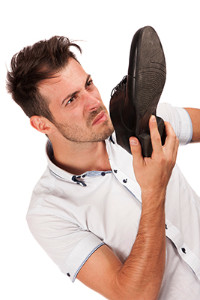 Athlete’s foot is a condition that many people may encounter at some point in their lives. While severe cases of the condition should be referred to a podiatrist, athlete’s foot prevention can be easy with the help of a few simple steps: Wash the feet thoroughly with soap and water, keep the feet clean and dry, wear clean socks and shoes, change shoes and socks often, practice good hygiene, wear sandals or slippers at a public shower or pool, use antifungal powder when needed, and wear shoes that are well-ventilated. Hygiene is key in preventing athlete’s foot and if practiced regularly, should keep the condition at bay.
Athlete’s foot is a condition that many people may encounter at some point in their lives. While severe cases of the condition should be referred to a podiatrist, athlete’s foot prevention can be easy with the help of a few simple steps: Wash the feet thoroughly with soap and water, keep the feet clean and dry, wear clean socks and shoes, change shoes and socks often, practice good hygiene, wear sandals or slippers at a public shower or pool, use antifungal powder when needed, and wear shoes that are well-ventilated. Hygiene is key in preventing athlete’s foot and if practiced regularly, should keep the condition at bay.
Athlete’s foot is an inconvenient condition that can be easily reduced with the proper treatment. If you have any concerns about your feet and ankles, contact the podiatrists from Associated Podiatric Physicians, PA. Our doctors will treat your foot and ankle needs.
Athlete’s Foot: The Sole Story
Athlete's foot, also known as tinea pedis, can be an extremely contagious foot infection. It is commonly contracted in public changing areas and bathrooms, dormitory style living quarters, around locker rooms and public swimming pools, or anywhere your feet often come into contact with other people.
Solutions to Combat Athlete’s Foot
- Hydrate your feet by using lotion
- Exfoliate
- Buff off nails
- Use of anti-fungal products
- Examine your feet and visit your doctor if any suspicious blisters or cuts develop
Athlete’s foot can cause many irritating symptoms such as dry and flaking skin, itching, and redness. Some more severe symptoms can include bleeding and cracked skin, intense itching and burning, and even pain when walking. In the worst cases, Athlete’s foot can cause blistering as well. Speak to your podiatrist for a better understanding of the different causes of Athlete’s foot, as well as help in determining which treatment options are best for you.
If you have any questions please feel free to contact our office located in Hamilton Township, NJ. We offer the newest diagnostic and treatment technologies for all your foot and ankle needs.
Read more about Athlete's FootAvoiding Athlete’s Foot
 Athlete’s foot is a condition that many people may encounter at some point in their lives. While severe cases of the condition should be referred to a podiatrist, athlete’s foot prevention can be easy with the help of a few simple steps: Wash the feet thoroughly with soap and water, keep the feet clean and dry, wear clean socks and shoes, change shoes and socks often, practice good hygiene, wear sandals or slippers at a public shower or pool, use antifungal powder when needed, and wear shoes that are well-ventilated. Hygiene is key in preventing athlete’s foot and if practiced regularly, should keep the condition at bay.
Athlete’s foot is a condition that many people may encounter at some point in their lives. While severe cases of the condition should be referred to a podiatrist, athlete’s foot prevention can be easy with the help of a few simple steps: Wash the feet thoroughly with soap and water, keep the feet clean and dry, wear clean socks and shoes, change shoes and socks often, practice good hygiene, wear sandals or slippers at a public shower or pool, use antifungal powder when needed, and wear shoes that are well-ventilated. Hygiene is key in preventing athlete’s foot and if practiced regularly, should keep the condition at bay.
Athlete’s foot is an inconvenient condition that can be easily reduced with the proper treatment. If you have any concerns about your feet and ankles, contact Donald Manger, DPM from Associated Podiatric Physicians, PA. Our doctor will treat your foot and ankle needs.
Athlete’s Foot: The Sole Story
Athlete's foot, also known as tinea pedis, can be an extremely contagious foot infection. It is commonly contracted in public changing areas and bathrooms, dormitory style living quarters, around locker rooms and public swimming pools, or anywhere your feet often come into contact with other people.
Solutions to Combat Athlete’s Foot
- Hydrate your feet by using lotion
- Exfoliate
- Buff off nails
- Use of anti-fungal products
- Examine your feet and visit your doctor if any suspicious blisters or cuts develop
Athlete’s foot can cause many irritating symptoms such as dry and flaking skin, itching, and redness. Some more severe symptoms can include bleeding and cracked skin, intense itching and burning, and even pain when walking. In the worst cases, Athlete’s foot can cause blistering as well. Speak to your podiatrist for a better understanding of the different causes of Athlete’s foot, as well as help in determining which treatment options are best for you.
If you have any questions please feel free to contact our office located in Hamilton Township, NJ . We offer the newest diagnostic and treatment technologies for all your foot and ankle needs.
Heel Pain in Children
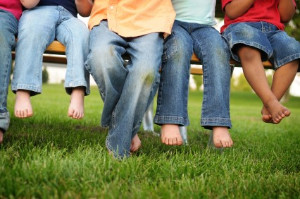 With warmer weather now upon us, many children make a return to outdoor sports and activities. Many parents may eventually face the issue of their children experiencing heel pain. In adolescents, heel pain is often caused by Sever’s disease. Pain is typically described as being at the back of the heel; this is where the growth plate has not fully developed yet. Sever’s disease is thought to occur because of a mismatch in the growth of the heel bones to the calf muscle and Achilles tendon. Rest and pain relief are key parts of treatment.
With warmer weather now upon us, many children make a return to outdoor sports and activities. Many parents may eventually face the issue of their children experiencing heel pain. In adolescents, heel pain is often caused by Sever’s disease. Pain is typically described as being at the back of the heel; this is where the growth plate has not fully developed yet. Sever’s disease is thought to occur because of a mismatch in the growth of the heel bones to the calf muscle and Achilles tendon. Rest and pain relief are key parts of treatment.
Making sure that your children maintain good foot health is very important as they grow. If you have any questions, contact the podiatrists of Associated Podiatric Physicians, PA. Our doctors can provide the care you need to keep you pain-free and on your feet.
Keeping Children's Feet Healthy
Having healthy feet during childhood can help prevent medical problems later in life, namely in the back and legs. As children grow, their feet require different types of care. Here are some things to consider...
Although babies do not walk yet, it is still very important to take care of their feet.
Avoid putting tight shoes or socks on his or her feet.
Allow the baby to stretch and kick his or her feet to feel comfortable.
As a toddler, kids are now on the move and begin to develop differently. At this age, toddlers are getting a feel for walking, so don’t be alarmed if your toddler is unsteady or ‘walks funny’.
As your child gets older, it is important to teach them how to take care of their feet.
Show them proper hygiene to prevent infections such as fungus.
Be watchful for any pain or injury.
Have all injuries checked by a doctor as soon as possible.
Comfortable, protective shoes should always be worn, especially at play.
If you have any questions please feel free to contact our office located in Hamilton Township, NJ. We offer the newest diagnostic and treatment technologies for all your foot and ankle needs.
Read more about What to Do to Keep Your Child’s Feet HealthyHeel Pain in Children
 With warmer weather now upon us, many children make a return to outdoor sports and activities. Many parents may eventually face the issue of their children experiencing heel pain. In adolescents, heel pain is often caused by Sever’s disease. Pain is typically described as being at the back of the heel; this is where the growth plate has not fully developed yet. Sever’s disease is thought to occur because of a mismatch in the growth of the heel bones to the calf muscle and Achilles tendon. Rest and pain relief are key parts of treatment.
With warmer weather now upon us, many children make a return to outdoor sports and activities. Many parents may eventually face the issue of their children experiencing heel pain. In adolescents, heel pain is often caused by Sever’s disease. Pain is typically described as being at the back of the heel; this is where the growth plate has not fully developed yet. Sever’s disease is thought to occur because of a mismatch in the growth of the heel bones to the calf muscle and Achilles tendon. Rest and pain relief are key parts of treatment.
Making sure that your children maintain good foot health is very important as they grow. If you have any questions, contact Donald Manger, DPM of Associated Podiatric Physicians, PA. Our doctor can provide the care you need to keep you pain-free and on your feet.
Keeping Children's Feet Healthy
Having healthy feet during childhood can help prevent medical problems later in life, namely in the back and legs. As children grow, their feet require different types of care. Here are some things to consider...
Although babies do not walk yet, it is still very important to take care of their feet.
Avoid putting tight shoes or socks on his or her feet.
Allow the baby to stretch and kick his or her feet to feel comfortable.
As a toddler, kids are now on the move and begin to develop differently. At this age, toddlers are getting a feel for walking, so don’t be alarmed if your toddler is unsteady or ‘walks funny’.
As your child gets older, it is important to teach them how to take care of their feet.
Show them proper hygiene to prevent infections such as fungus.
Be watchful for any pain or injury.
Have all injuries checked by a doctor as soon as possible.
Comfortable, protective shoes should always be worn, especially at play.
If you have any questions please feel free to contact our office located in Hamilton Township, NJ . We offer the newest diagnostic and treatment technologies for all your foot and ankle needs.
Reducing Inflammation in Arthritic Feet
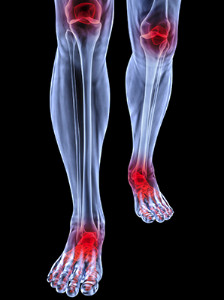 Arthritis is a very common disease that can affect joints in areas all over the body. Arthritis of the feet can be especially painful and debilitating due to the constant weight put on that section of the body. For someone with arthritic feet, every step taken can be excruciating. There are many different types of arthritis, though inflammatory arthritis can be one of the most devastating. Rheumatoid arthritis is one such type, where the cartilage of the joints is being destroyed. Though there is really no set diet to cure this illness, there are some recommended foods that may prove effective in helping mitigate some of the arthritic symptoms. The key is to reduce inflammation. Certain foods that help do just that are nuts, fish, and, dark vegetables.
Arthritis is a very common disease that can affect joints in areas all over the body. Arthritis of the feet can be especially painful and debilitating due to the constant weight put on that section of the body. For someone with arthritic feet, every step taken can be excruciating. There are many different types of arthritis, though inflammatory arthritis can be one of the most devastating. Rheumatoid arthritis is one such type, where the cartilage of the joints is being destroyed. Though there is really no set diet to cure this illness, there are some recommended foods that may prove effective in helping mitigate some of the arthritic symptoms. The key is to reduce inflammation. Certain foods that help do just that are nuts, fish, and, dark vegetables.
Arthritis can be a difficult condition to live with. If you are seeking treatment, contact the podiatrists from Associated Podiatric Physicians, PA. Our doctors can provide the care you need to keep you pain-free and on your feet.
Arthritic Foot Care
Arthritis is a joint disorder that involves the inflammation of different joints in your body, such as those in your feet. Arthritis is often caused by a degenerative joint disease and causes mild to severe pain in all affected areas. In addition to this, swelling and stiffness in the affected joints can also be a common symptom of arthritis.
In many cases, wearing ill-fitting shoes can worsen the effects and pain of arthritis. Wearing shoes that have a lower heel and extra room can help your feet feel more comfortable. In cases of rheumatoid arthritis, the arch in your foot may become problematic. Buying shoes with proper arch support that contour to your feet can help immensely.
Alleviating Arthritic Pain
- Exercises that stretch the foot can prevent further pain and injury and increase mobility
- Most of the pain can be alleviated with anti-inflammatory drugs, heat, and topical medications
- Massages can help temporarily alleviate pain.
It is best to see your doctor for the treatment that is right for your needs and symptoms. Conditions vary, and a podiatrist can help you determine the right method of care for your feet.
If you have any questions, please feel free to contact our office located in Hamilton Township, NJ. We offer the newest diagnostic tools and technology to treat your foot and ankle needs.
Read more about Arthritic Foot CareMore...
Reducing Inflammation in Arthritic Feet
 Arthritis is a very common disease that can affect joints in areas all over the body. Arthritis of the feet can be especially painful and debilitating due to the constant weight put on that section of the body. For someone with arthritic feet, every step taken can be excruciating. There are many different types of arthritis, though inflammatory arthritis can be one of the most devastating. Rheumatoid arthritis is one such type, where the cartilage of the joints is being destroyed. Though there is really no set diet to cure this illness, there are some recommended foods that may prove effective in helping mitigate some of the arthritic symptoms. The key is to reduce inflammation. Certain foods that help do just that are nuts, fish, and, dark vegetables.
Arthritis is a very common disease that can affect joints in areas all over the body. Arthritis of the feet can be especially painful and debilitating due to the constant weight put on that section of the body. For someone with arthritic feet, every step taken can be excruciating. There are many different types of arthritis, though inflammatory arthritis can be one of the most devastating. Rheumatoid arthritis is one such type, where the cartilage of the joints is being destroyed. Though there is really no set diet to cure this illness, there are some recommended foods that may prove effective in helping mitigate some of the arthritic symptoms. The key is to reduce inflammation. Certain foods that help do just that are nuts, fish, and, dark vegetables.
Arthritis can be a difficult condition to live with. If you are seeking treatment, contact Donald Manger, DPM from Associated Podiatric Physicians, PA. Our doctor can provide the care you need to keep you pain-free and on your feet.
Arthritic Foot Care
Arthritis is a joint disorder that involves the inflammation of different joints in your body, such as those in your feet. Arthritis is often caused by a degenerative joint disease and causes mild to severe pain in all affected areas. In addition to this, swelling and stiffness in the affected joints can also be a common symptom of arthritis.
In many cases, wearing ill-fitting shoes can worsen the effects and pain of arthritis. Wearing shoes that have a lower heel and extra room can help your feet feel more comfortable. In cases of rheumatoid arthritis, the arch in your foot may become problematic. Buying shoes with proper arch support that contour to your feet can help immensely.
Alleviating Arthritic Pain
- Exercises that stretch the foot can prevent further pain and injury and increase mobility
- Most of the pain can be alleviated with anti-inflammatory drugs, heat, and topical medications
- Massages can help temporarily alleviate pain.
It is best to see your doctor for the treatment that is right for your needs and symptoms. Conditions vary, and a podiatrist can help you determine the right method of care for your feet.
If you have any questions, please feel free to contact our office located in Hamilton Township, NJ . We offer the newest diagnostic tools and technology to treat your foot and ankle needs.
Foot Concerns for People of a Certain Age
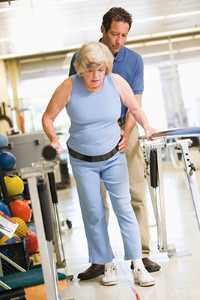 Foot diseases and other foot-related problems often become more prevalent as we age. Years of bearing body weight and certain ailments can combine to wreak havoc on the feet and ankles. The foot problems we may experience as time goes on vary from minor to potentially very serious. First and foremost, if you are a diabetic, foot care needs to be a high priority. Diabetic ulcers and sores, if left untreated, can lead to infection and even gangrene, resulting in amputation. Daily foot inspections are necessary to ensure that there are no cuts, sores, or swelling. Even something as seemingly minor as cracked skin on the foot can lead to terrible consequences if gone unnoticed. Using moisturizer and soap that doesn’t dry out the skin can help in this area. That being said, it is also important to keep the feet dry, as toenail fungus grows more readily in moist environments. Keeping the feet elevated is also a good tip. This will help circulate the blood to the lower extremities. Poor circulation can lead to serious medical conditions.
Foot diseases and other foot-related problems often become more prevalent as we age. Years of bearing body weight and certain ailments can combine to wreak havoc on the feet and ankles. The foot problems we may experience as time goes on vary from minor to potentially very serious. First and foremost, if you are a diabetic, foot care needs to be a high priority. Diabetic ulcers and sores, if left untreated, can lead to infection and even gangrene, resulting in amputation. Daily foot inspections are necessary to ensure that there are no cuts, sores, or swelling. Even something as seemingly minor as cracked skin on the foot can lead to terrible consequences if gone unnoticed. Using moisturizer and soap that doesn’t dry out the skin can help in this area. That being said, it is also important to keep the feet dry, as toenail fungus grows more readily in moist environments. Keeping the feet elevated is also a good tip. This will help circulate the blood to the lower extremities. Poor circulation can lead to serious medical conditions.
If you need your feet checked, contact the podiatrists of Associated Podiatric Physicians, PA. Our doctors will attend to all of your foot and ankle needs and provide you with quality treatment.
Geriatrics and Podiatry
When people age, some common issues that may occur are bone density loss, dry skin, poor circulation, and rough brittle nails. These issues may also affect your foot health if the necessary steps are not taken to alleviate the problems.
It is important to take care of your feet because feet that are injured or diseased can affect your overall health. Having painful feet hinders your ability to do daily activities or may decrease your willingness to do the things that you need to do.
Visiting Your Geriatrician
As we age, health problems become more likely, so it is essential to visit your doctor for check-ups to ensure that you are doing the best you can to take care of your health. It is recommended to check your feet frequently for any possible cuts, bruises, swelling, corns or any other irregularities.
Taking Care of Elderly Feet
Cracked or dry feet can be treated by applying moisturizer often. It is also important not to wear old socks because the older the sock is, the higher the possibility there will be that there is bacteria there. Wear fresh socks and make sure they fit properly.
Proper foot health means that you can have a more active lifestyle and you will not be bogged down by pain. Foot health also leads to good circulation, which is paramount for overall health.
If you have any questions, please feel free to contact our office located in Hamilton Township, NJ. We offer the newest diagnostic tools and technology to treat your foot and ankle needs.
Read more about Geriatrics and PodiatryFoot Concerns for People of a Certain Age
 Foot diseases and other foot-related problems often become more prevalent as we age. Years of bearing body weight and certain ailments can combine to wreak havoc on the feet and ankles. The foot problems we may experience as time goes on vary from minor to potentially very serious. First and foremost, if you are a diabetic, foot care needs to be a high priority. Diabetic ulcers and sores, if left untreated, can lead to infection and even gangrene, resulting in amputation. Daily foot inspections are necessary to ensure that there are no cuts, sores, or swelling. Even something as seemingly minor as cracked skin on the foot can lead to terrible consequences if gone unnoticed. Using moisturizer and soap that doesn’t dry out the skin can help in this area. That being said, it is also important to keep the feet dry, as toenail fungus grows more readily in moist environments. Keeping the feet elevated is also a good tip. This will help circulate the blood to the lower extremities. Poor circulation can lead to serious medical conditions.
Foot diseases and other foot-related problems often become more prevalent as we age. Years of bearing body weight and certain ailments can combine to wreak havoc on the feet and ankles. The foot problems we may experience as time goes on vary from minor to potentially very serious. First and foremost, if you are a diabetic, foot care needs to be a high priority. Diabetic ulcers and sores, if left untreated, can lead to infection and even gangrene, resulting in amputation. Daily foot inspections are necessary to ensure that there are no cuts, sores, or swelling. Even something as seemingly minor as cracked skin on the foot can lead to terrible consequences if gone unnoticed. Using moisturizer and soap that doesn’t dry out the skin can help in this area. That being said, it is also important to keep the feet dry, as toenail fungus grows more readily in moist environments. Keeping the feet elevated is also a good tip. This will help circulate the blood to the lower extremities. Poor circulation can lead to serious medical conditions.
If you need your feet checked, contact Donald Manger, DPM of Associated Podiatric Physicians, PA. Our doctor will attend to all of your foot and ankle needs and provide you with quality treatment.
Geriatrics and Podiatry
When people age, some common issues that may occur are bone density loss, dry skin, poor circulation, and rough brittle nails. These issues may also affect your foot health if the necessary steps are not taken to alleviate the problems.
It is important to take care of your feet because feet that are injured or diseased can affect your overall health. Having painful feet hinders your ability to do daily activities or may decrease your willingness to do the things that you need to do.
Visiting Your Geriatrician
As we age, health problems become more likely, so it is essential to visit your doctor for check-ups to ensure that you are doing the best you can to take care of your health. It is recommended to check your feet frequently for any possible cuts, bruises, swelling, corns or any other irregularities.
Taking Care of Elderly Feet
Cracked or dry feet can be treated by applying moisturizer often. It is also important not to wear old socks because the older the sock is, the higher the possibility there will be that there is bacteria there. Wear fresh socks and make sure they fit properly.
Proper foot health means that you can have a more active lifestyle and you will not be bogged down by pain. Foot health also leads to good circulation, which is paramount for overall health.
If you have any questions, please feel free to contact our office located in Hamilton Township, NJ . We offer the newest diagnostic tools and technology to treat your foot and ankle needs.
Decreasing Gout Risk
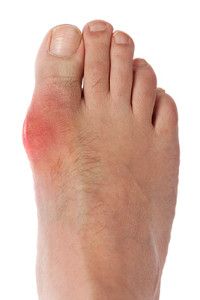 Gout is one of the most painful forms of arthritis, commonly affecting those aged 60 and higher. Associated with high levels of uric acid, gout is typically characterized by pain and redness in the joints. Many health professionals agree that gout risk can be lowered by managing one’s diet, which involves reducing foods and drinks high in purine from one’s food intake. These foods include alcohol, red meat, organ meat such as liver or kidney, certain seafoods, drinks high in fructose, and processed foods. Lowering one’s uric acid levels is key in reducing gout risk.
Gout is one of the most painful forms of arthritis, commonly affecting those aged 60 and higher. Associated with high levels of uric acid, gout is typically characterized by pain and redness in the joints. Many health professionals agree that gout risk can be lowered by managing one’s diet, which involves reducing foods and drinks high in purine from one’s food intake. These foods include alcohol, red meat, organ meat such as liver or kidney, certain seafoods, drinks high in fructose, and processed foods. Lowering one’s uric acid levels is key in reducing gout risk.
Gout is a foot condition that requires certain treatment and care. If you are seeking treatment, contact the podiatrists from Associated Podiatric Physicians, PA. Our doctors will treat your foot and ankle needs.
What Is Gout?
Gout is a type of arthritis caused by a buildup of uric acid in the bloodstream. It often develops in the foot, especially the big toe area, although it can manifest in other parts of the body as well. Gout can make walking and standing very painful and is especially common in diabetics and the obese.
People typically get gout because of a poor diet. Genetic predisposition is also a factor. The children of parents who have had gout frequently have a chance of developing it themselves.
Gout can easily be identified by redness and inflammation of the big toe and the surrounding areas of the foot. Other symptoms include extreme fatigue, joint pain, and running high fevers. Sometimes corticosteroid drugs can be prescribed to treat gout, but the best way to combat this disease is to get more exercise and eat a better diet.
If you have any questions please feel free to contact our office located in Hamilton Township, NJ. We offer the newest diagnostic and treatment technologies for all your foot and ankle needs.
Read more about Everything You Need to Know About Gout